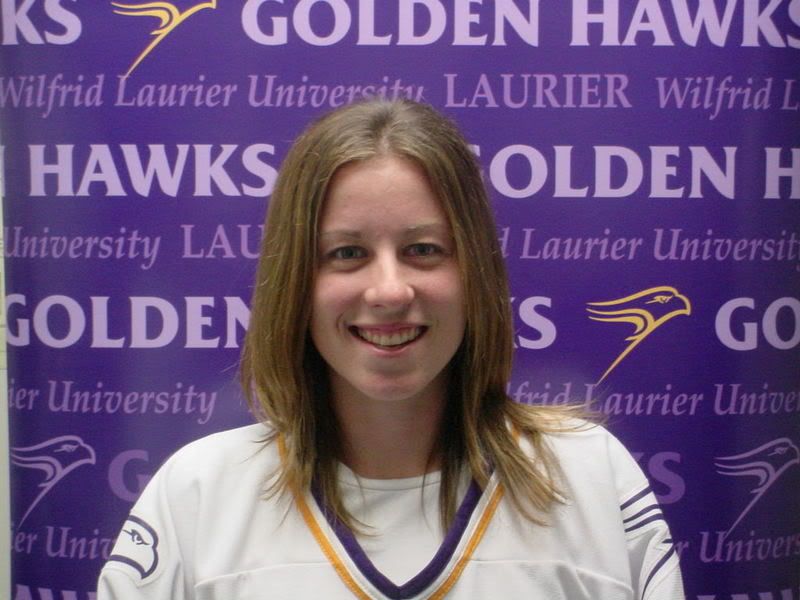 Being on the med school track and playing for one of the top university women's hockey teams in Canada just isn't enough to keep Ottawa's Fiona Aiston fulfilled.
Being on the med school track and playing for one of the top university women's hockey teams in Canada just isn't enough to keep Ottawa's Fiona Aiston fulfilled.The 23-year-old Nepean High alumna who'll wrap up her university career in her hometown this weekend by playing in the 2007 SMART CIS hockey championship had an epiphany not long after helping the Laurier Golden Hawks win the national title in 2005.
"My life was revolving around doing well in school, training hard for hockey and having my personal life, friends and stuff like that," says Aiston, a speedy left-wing for Laurier.
"I didn't feel that completed me as a person. So getting into volunteering was a way to reconnect. I realized how satisfying it is just trying to put a smile on someone else's face."
Aiston found an outlet at Kids Ability in Waterloo, Ont., which assists children and young adults with communication, developmental and physical disabilities, and makes sure she gets out to pitch in at least one morning eachweek. An aspiring medical student who's been part of four straight OUA championships at Laurier, she recently received the OUA's Marion Hillard Award, which recognizes outstanding academic, athletic and volunteer achievement. She was also the first recipient of the Outstanding Women At Laurier Award, a similar honour.
"Fiona's effort on the ice is matched by her effort in the community," Laurier coach Rick Obsorne said. "She's a very caring teammate -- just a great leader."
Playing for a CIS title in her hometown is a thrill in itself. Laurier doesn't play Ottawa or Carleton in the regular season, so often only parents Ed and Joyce can make it to Aiston's games. She will have a big cheering section on Friday when the Golden Hawks meet the host Gee-Gees (7:30, SSN Canada).
'STRONG BONDS'
"These nationals are going to be a great way to finish my career," said Aiston, who has CIS gold and silver medals to her credit. "I have 25-30 friends and family who are finally going to get to see me play."
It's also the end of a four-year run, whatever happens.
"I have strong bonds with a lot of the women on the team," said Aiston, who's an assistant captain. "It's going to be a big loss in my life. It will leave a big hole."
Aiston was also up for the national Hillard Award which ultimately went to Alberta's Taryn Barry. She quickly pointed out that in this regard she's just one out of dozens across Canada.
"The other women who are up for it are really outstanding athletes and really outstanding people, so it's not important if I don't win," she said prior to the presentation. "There's a lot of the people in the CIS and in women's hockey who are doing the same thing.
Our captain, Laurissa Kenworthy, she goes to a high school and helps teach a gym class for kids with special needs. Some of the other women on our team help coach a young women's team. As fourth-year players, we try to pass along that is all part of being a varsity athlete."
Ask about the Hollywood ending -- taking a victory lap after Monday night's championship game in front of family and friends -- and Aiston exclaims, "Omigod, yeah, that'd be great."
There's something to the way she says it that lets you know she's ready to go out and take on the wider world. There are dozens of young people across Canadian university sports who are similar to Aiston, female and male, and it's enough to make you feel a little more optimistic about the future.
AN ODD DIVIDING LINE
Call it a CIS conundrum: The Gee-Gees playing hostess meant the Quebec conference had two berths for its four teams. The OUA, which is set to go from nine teams to 10 next season when the UOIT Ridgebacks join the league, has only one.
Ottawa coach Shelley Coolidge said playing in the Quebec Student Sport Federation instead of the OUA comes down to "politics and money," explaining that "the reality for us is that for the girls to stay in the QSSF, it's an hour and a half to a two-hour bus ride (to McGill or Concordia in Montreal)," as opposed to longer trips to southwestern Ontario.
Still, Osborne noted "it would be nice to get a second berth out of the OUA." That's the roadblock. It doesn't seem like a fair system, but is having two separate leagues (as opposed to one for the men) justified if it keeps costs down and allows for more schools to give women a chance to play?
(Photo courtesy Wilfrid Laurier University; much thanks to Ari Grossman.)
That's all for now. Send your thoughts to neatesager@yahoo.ca.






No comments:
Post a Comment